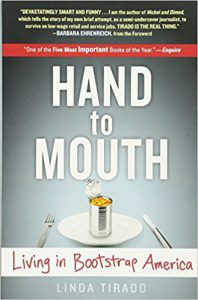Hand to Mouth: Living in Bootstrap America, by Linda Tirado
Hand to Mouth: Living in Bootstrap America
By Linda Tirado
G.P. Putnam’s Sons
Five stars
Reviewed by Jessica Gribble
Never mind all the words like “honest” and “eye-opening” that can be applied to Linda Tirado’s forthright book Hand to Mouth: Living in Bootstrap America. Most of us know that some Americans are rich, many are doing fine, and too many are poor. But most of us don’t spend a lot of time listening to people whose lifestyle is fundamentally different from our own, so in this book, Tirado speaks for poor people. She’s really funny. She’s confrontational, generous, angry, smart, stressed out, insightful, exhausted, loving, in pain: in short, human. Anyone who bothers to listen to her will learn a lot about what life is like when you’re poor, how public policy could help solve some of the problems of poverty, and how offensive and annoying people with relatively minor problems can be to people who struggle to make it every single day.
As she says, “I haven’t had it worse than anyone else, and actually, that’s kind of the point. This is just what life is for roughly a third of the country…. It’s not like everyone grows up and dreams of working two essentially meaningless part-time jobs while collecting food stamps. It’s just that there aren’t many other options for a lot of people.”
The best thing about this book is its raw sense of humor. Just reading a few chapter titles will give you a good idea: “You Can’t Pay a Doctor in Chickens Anymore.” “I’m Not Angry So Much as I’m Really Tired.” “This Part Is About Sex.” “Poverty is Fucking Expensive.”
Tirado is often talking directly to readers: “I’m not even going to bother explaining how bad teeth and bad skin might also get you pegged as less valuable, less worthy of respect. You’re reading a book voluntarily, you’re smart enough to figure it out.” Her conspiratorial tone manages to both welcome and implicate those of us who aren’t poor. It’s good that we care; it’s good that the book enrages us; but it’s not enough just to read it. If you’ve got power, Tirado is saying, help fix the brutalities and indignities of being poor. If you’ve got a heart, give people a break, even if they don’t smile at you when you buy wrapping paper at the Dollar Tree.
In fact, she spends a fair amount of time reminding readers that people are all essentially the same. “We all cope in our own special ways. I smoke. My friend drinks. In fact, I’m highly confident that you and many of your friends cope by drinking as well…. Why are other people’s coping mechanisms better than poor people’s? Because they’re prettier. People with more money drink better wine out of nicer glasses.”
If there’s a criticism to make, it’s that Tirado so often sounds defensive. She belabors the point that her experience isn’t the same as that of every poor person and reminds readers too often that poor people have the same emotions as everyone else. Never mind. We all feel defensive when we’re telling our own stories; we all try to anticipate every objection and make people like us.
It’s clear that professors will start assigning this book to students right away. Good. Let’s hope those students go out and turn Linda Tirado’s personal description of poverty in the United States into better public policies. And let’s all realize that poor people can be just as smart, funny, and loving as people whose lives have been easier at every turn. This is a good book, and it’s an important book. Plus, it’s sarcastic and funny. Everyone should read it. Everyone should act.
